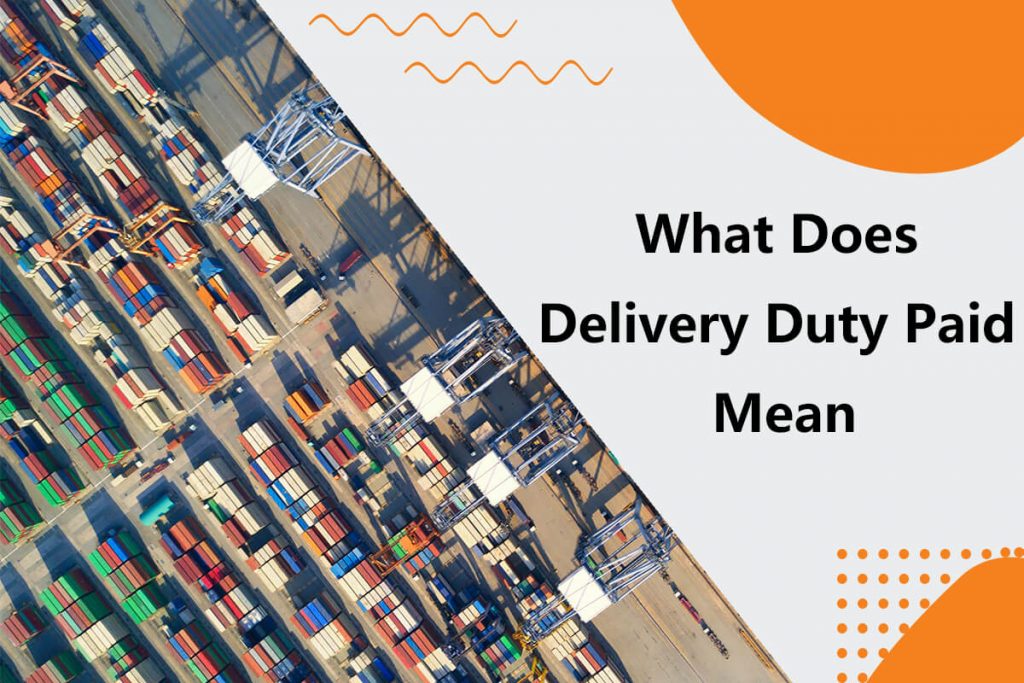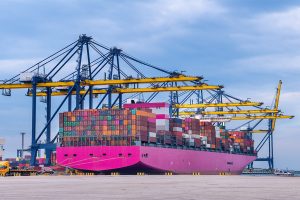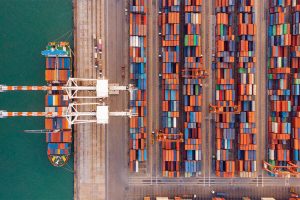
International trade is the backbone of the world economics. Businesses and consumers worldwide benefit from the exchange of goods and services across borders. But, international trade is full of regulations, terms, and logistics that can often seem daunting to those embarking on cross-border transactions.
Among the myriad of terms and acronyms that characterize this arena, Delivery Duty Paid(DDP) stands out as a crucial incoterm in international trading. In this exploration, we will dive into the concept of Delivery Duty Paid in international trade.
We will unravel its meaning, significance, and implications for both buyers and sellers engaged in global commerce.
Let’s start.
What Is Delivery Duty Paid?

Delivery Duty Paid, commonly referred to as DDP, is an incoterm used in international trade to put the onus of responsibility on the seller for all major costs and risks of delivering the goods to a pre-decided destination in the buyer’s country.
This incoterm sets out clear terms for the delivery of goods and the obligations of both the seller and the buyer.
Supply Chain Timeline in Delivery Duty Paid

A DDP contract in international trade involves a well-defined supply chain timeline with specific milestones and responsibilities. This section outlines the various stages from the initiation of the contract to the final delivery of goods.
1. Contract Initiation and Agreement
The buyer and seller discuss and mutually agree to the terms of the DDP contract, including the agreed-upon destination within the buyer’s country.
2. Production and Packaging
The seller manufactures or sources the goods according to the specifications outlined in the contract. Items are secured in good packaging to ensure safe transportation.
3. Export Procedures (Seller’s Country)
The seller completes export customs clearance in their own country, ensuring that the goods meet all export requirements. The seller arranges for transportation to the port of departure, which may involve land, sea, or air transport.
4. International Shipping
The goods are loaded onto the chosen mode of transportation (e.g., ship, plane, truck) for international shipping. The seller may arrange for insurance to cover the goods during transit.
5. Import Procedures (Buyer’s Country)
Upon arrival in the buyer’s country, the goods go through customs clearance, which is also the seller’s responsibility. This includes paying import duties and taxes. The buyer arranges for the shipment of the items from the port of export to a decided place in the country of import.
6. Inland Transportation (Buyer’s Country)
The buyer manages the transportation of the goods within their country to the agreed-upon destination.
7. Delivery to Buyer’s Location
The buyer is held responsible for unloading the items at their facility or designated location. Upon delivery and inspection, the buyer accepts the goods if they meet the agreed-upon specifications.
8. Conclusion of DDP Transaction
The buyer makes the final payment to the seller, including the cost of the goods, transportation, and any other agreed-upon charges. The DDP contract is considered fulfilled, and ownership of the goods is fully transferred to the buyer.
Why Delivery Duty Paid Important in International Trade?

The Delivery Duty Paid incoterm plays a crucial role in international trade due to its significance in simplifying and facilitating cross-border transactions.
Here are the key importance of DDP in international trade:
- Simplified Import Process DDP shifts the responsibility for import procedures and customs clearance from the buyer to the seller. This simplifies the buying process for international buyers who may not be familiar with complex import regulations.
- Cost Predictability DDP provides buyers with cost predictability. They know the total cost upfront, including the cost of goods, transportation, customs duties, and other charges, making it easier to budget accurately.
- Reduced Risk for Buyers Until the goods are delivered to the buyer’s specified location, the seller bears the risk, reducing the buyer’s exposure to potential damage, loss, or delays during transit.
- Competitive Advantage for Sellers Sellers offering DDP terms can attract more prejudice by providing a comprehensive service that includes delivery to the buyer’s location. This can make their products more attractive to global customers.
- Enhanced Customer Relations DDP can lead to improved customer satisfaction and better relations. Buyers experience a seamless import process. They can refer the same to other buyers, thereby increasing the business for the sellers.
- Access to New Markets For sellers, DDP can open doors to new markets where buyers prefer simplified import procedures. This can expand the seller’s reach and market opportunities.
- Compliance with Import Regulations Sellers experienced in handling DDP transactions ensure compliance with import regulations in the buyer’s country, reducing the risk of customs-related issues and delays.
- Risk Management DDP allows for effective risk management by shifting risks to the seller during the transportation phase. This may practically be relevant to industries with high-value or fragile goods.
- Streamlined Communication With DDP, sellers handle logistics and customs processes, reducing the need for extensive communication between buyer and seller during the import process.
- Clarity in Responsibilities DDP clearly defines the responsibilities of each party, minimizing misunderstandings and disputes related to costs, customs clearance, and other logistics issues.
- Efficient Supply Chain DDP can contribute to an efficient and streamlined supply chain, ensuring that goods are delivered to the buyer’s location as per the agreed terms.
- Ease of Business DDP allows businesses to enter international markets with less complexity, making it easier to explore new opportunities and expand their global presence.
Risks and Costs of Delivery Duty Paid

When engaging in Delivery Duty Paid agreements in international trade, it’s essential to understand the risks and costs associated with it. Both sellers and buyers bear specific responsibilities and financial implications. This section explores the risks and costs for both parties in DDP transactions.
Risks and Costs of DDP for Seller
Here are the costs and risks associated with the seller in the Delivery Duty Paid Incoterms:
- Shipment Sellers are responsible for arranging and paying for the transportation of goods from their location to the buyer’s specified destination. They must navigate the complexities of international shipping, which can be costly and pose logistical challenges.
- Damages During Transit Until the goods are delivered and accepted by the buyer, the seller is considered responsible and accountable for the damage or loss during transportation. This risk requires sellers to ensure proper packaging and secure shipping methods.
- Customs Handling on Both Sides Sellers need to manage customs clearance in their own country, which can involve complex regulations and potential delays. Additionally, they must ensure that all necessary documentation is complete and accurate to avoid customs issues in the buyer’s country.
- Tax Sellers may incur export taxes or duties in their country, depending on local regulations. They need to account for these costs in their pricing.
- Uncertainty Factors Economic and political factors, such as fluctuating exchange rates and changes in trade policies, can impact costs and risks for sellers engaged in DDP transactions.
Risks and Costs of DDP for Buyer
Here are the risks and costs that a seller has to bear in the DDP Incoterms.
- Expensive Contract Buyers often face higher overall costs in DDP transactions compared to other incoterms because sellers factor in expenses such as transportation, insurance, and customs duties. These costs are typically included in the product price.
- Unloading at Destination Buyers must cover the costs associated with unloading the goods at their facility or designated location, including any handling fees or equipment needed for unloading.
- Assistance in Customs Clearance While customs clearance in the buyer’s country is primarily their responsibility, some DDP agreements may include the seller’s assistance or arrangements for a smoother clearance process. Buyers should discuss and negotiate this aspect with sellers.
When Should You Choose a DDP Agreement?
Choosing a DDP agreement in international trade should be based on specific circumstances and considerations. DDP can be a beneficial incoterm in certain situations.
Here’s when you should consider opting for a DDP agreement:
- Lack of Import Expertise If you are unfamiliar with the import regulations, customs procedures, and tax requirements of the buyer’s country, DDP can be advantageous. The seller takes care of these complexities, reducing your administrative burden.
- Simplified Buying Process DDP simplifies the import process for buyers. If you prefer a hassle-free experience and want the seller to handle logistics and customs clearance, DDP is a suitable choice.
- Minimal Transportation Involvement When you don’t want to be responsible for arranging and coordinating the transportation of goods from the seller’s location to your destination, DDP is a good option. The seller takes care of this aspect.
- Risk Mitigation DDP places the onus of risk on the seller until the goods are delivered to your specified location. If you want to minimize risk exposure during transit, DDP can be beneficial.
- Limited Local Presence If you don’t have a physical presence or contacts in the seller’s country to manage export procedures and quality control, DDP allows you to rely on the seller’s expertise.
- Specific Destination When you have a fixed destination in your country where you want the goods delivered, DDP is suitable. The seller has to ensure the goods reach that location.
- Supplier’s Strength in Logistics If your supplier has good links in logistics for the international supply chain, DDP can leverage their capabilities, ensuring timely and efficient delivery.
Tips for a Profitable DDP Agreement for Buyers

Creating a profitable Delivery Duty Paid agreement as a buyer in international trade involves careful planning, negotiation, and understanding of the terms.
Here are some tips to help you achieve a profitable DDP agreement:
- Clear Contract Terms Ensure that the DDP contract clearly outlines all terms and responsibilities, including the exact delivery location, quality specifications, and payment terms.
- Negotiate Pricing Negotiate favorable pricing with the seller, considering not only the cost of goods but also transportation, insurance, and any additional charges.
- Thorough Due Diligence Conduct due diligence on the seller to ensure they have a reliable track record in handling DDP transactions and can manage the logistics effectively.
- Understand Import Duties Familiarize yourself with the import duties, taxes, and regulations in your country. If you already have an idea of these costs, you will have more transparency to plan your budget.
- Customs Clearance Ensure that the seller is experienced in handling customs clearance in your country. Delays or errors in this process can be costly.
- Delivery Schedule Agree on a realistic delivery schedule with the seller to avoid disruptions to your operations and potential financial losses due to delays.
- Insurance Coverage Verify that the seller provides adequate insurance coverage for the goods during transit. If not, consider obtaining additional coverage to protect against damage or loss.
- Quality Control Implement a system for quality control upon receipt of the goods to ensure they meet the agreed-upon specifications. Address any issues promptly with the seller.
- Payment Control Make payments as per the agreed-upon terms and milestones. Ensure that payment release is tied to the successful completion of each stage of the transaction.
- Dispute Resolution Include a dispute resolution mechanism in the contract, specifying how disputes will be addressed to avoid costly legal battles.
- Communicate Clearly Maintain open and clear communication with the seller throughout the process. Address any concerns or changes promptly to prevent misunderstandings.
- Plan for Contingencies Have contingency plans in place for unexpected events like customs delays, transportation issues, or changes in regulations.
- Evaluate Total Cost Consider the total cost of the DDP agreement, including all fees and expenses, to ensure that the deal remains profitable for your business.
- Continuous Improvement After the transaction, evaluate the DDP process for areas of improvement. Learn from your experiences to enhance future DDP agreements.
- Legal Consultation If dealing with complex international trade regulations or unfamiliar jurisdictions, seek legal advice to ensure compliance and protect your interests.
Pros and Cons of Delivery Duty Paid (DDP) Incoterms

To have a clear concept of Delivery Duty Paid Incoterms, let’s have an overview of its pros and cons:
Pros
- Simplified Process for Buyers DDP simplifies the buying process for international buyers by placing the responsibility for most logistics and customs procedures on the seller.
- Cost Predictability Buyers benefit from cost predictability, as the seller is responsible for covering most costs, allowing buyers to budget accurately.
- Reduced Risk for Buyers Until goods are delivered to the buyer’s location, the seller bears the risk, reducing the buyer’s exposure to potential damage or loss during transit.
- Enhanced Customer Relations DDP can lead to improved customer satisfaction and better relationships as buyers experience a seamless import process.
- Access to New Markets Sellers can access new markets where buyers prefer simplified import procedures, expanding their market reach.
- Compliance with Import Regulations Sellers familiar with the import regulations of the buyer’s country can ensure compliance, reducing customs-related issues.
Cons
- Cost for Sellers Sellers must accurately calculate and manage all costs associated with DDP, which can be challenging and potentially lead to financial losses if not properly accounted for.
- Limited Control for Buyers Buyers have limited control over customs procedures, which can lead to delays or complications if not managed efficiently.
- Potential Disputes Misunderstandings between buyers and sellers regarding responsibilities or costs can lead to disputes.
- Complexity of Import Duties Buyers may face complex import duties and taxes that can vary widely by country and product, making it important to understand these regulations.
- Higher Overall Costs DDP transactions may have higher overall costs due to the inclusion of various fees and expenses paid by the seller.
- Risk of Non-Compliance If sellers do not fully understand or comply with import regulations in the buyer’s country, it can lead to customs issues and delays.
- Dependence on Seller’s Performance Buyers depend on the seller’s ability to manage logistics effectively and deliver goods on time, which can be a risk if the seller’s performance is subpar.
FAQs about Delivery Duty Paid in International Trading
Read the answers to the following FAQs about the DDP Incoterms to address your queries about this important shipping Incoterm:
Is DDP Suitable for All International Trade Transactions?
DDP is commonly used when buyers prefer a hassle-free, fully managed import process, but it may not be cost-effective for all situations. Buyers and sellers should consider the specific circumstances of their trade and choose incoterms that align with their needs.
Are DDP Agreements Legally Binding?
Yes, DDP agreements, like any international trade agreements, are used for legal implications. The proper agreement has all the predefined terms of service of the transaction. It is crucial for both parties to adhere to the terms specified in the contract.
Can DDP Terms Be Negotiated?
Yes, you can negotiate the terms of a DDP agreement with the seller to align with specific needs and preferences. It’s essential to clearly define these terms in the contract to avoid misunderstandings.
What Is the Difference Between Delivered Duty Paid (DDP) and Delivered At Place(DAP)?
The main difference between Delivered Duty Paid (DDP) and Delivered at Place (DAP) lies in the point of delivery and the allocation of certain costs and risks. In DDP agreements, the seller has to deliver the items at a named place within the buyer’s country and unload them at that location while also covering import duties and taxes.
In contrast, DAP requires the seller to deliver the goods to a named place within the buyer’s country, but the unloading process is generally the buyer’s responsibility. Additionally, DAP places the responsibility for import duties and taxes on the buyer.
Conclusion
Delivery Duty Paid (DDP) incoterms in international trading play a vital role in simplifying cross-border transactions. They define the responsibilities and obligations of both buyers and sellers, making it easier to navigate the complexities of global commerce. DDP offers advantages such as a simplified import process, cost predictability, and reduced risk for buyers while also providing sellers with a competitive edge and access to new markets.
However, it’s crucial to be aware of the potential disadvantages and challenges associated with DDP, including higher overall costs for buyers and limited control over certain logistics aspects. To ensure successful DDP transactions, both parties must communicate effectively, understand their roles, and have contingency plans in place for unexpected events. By understanding the key elements, risks, and costs of DDP agreements, you can decide and plan your shipments in advance to support your business. If you want professional assistance to import the items at cost-effective prices, ask for a free quote now. One of our sourcing agents will contact you right away.




